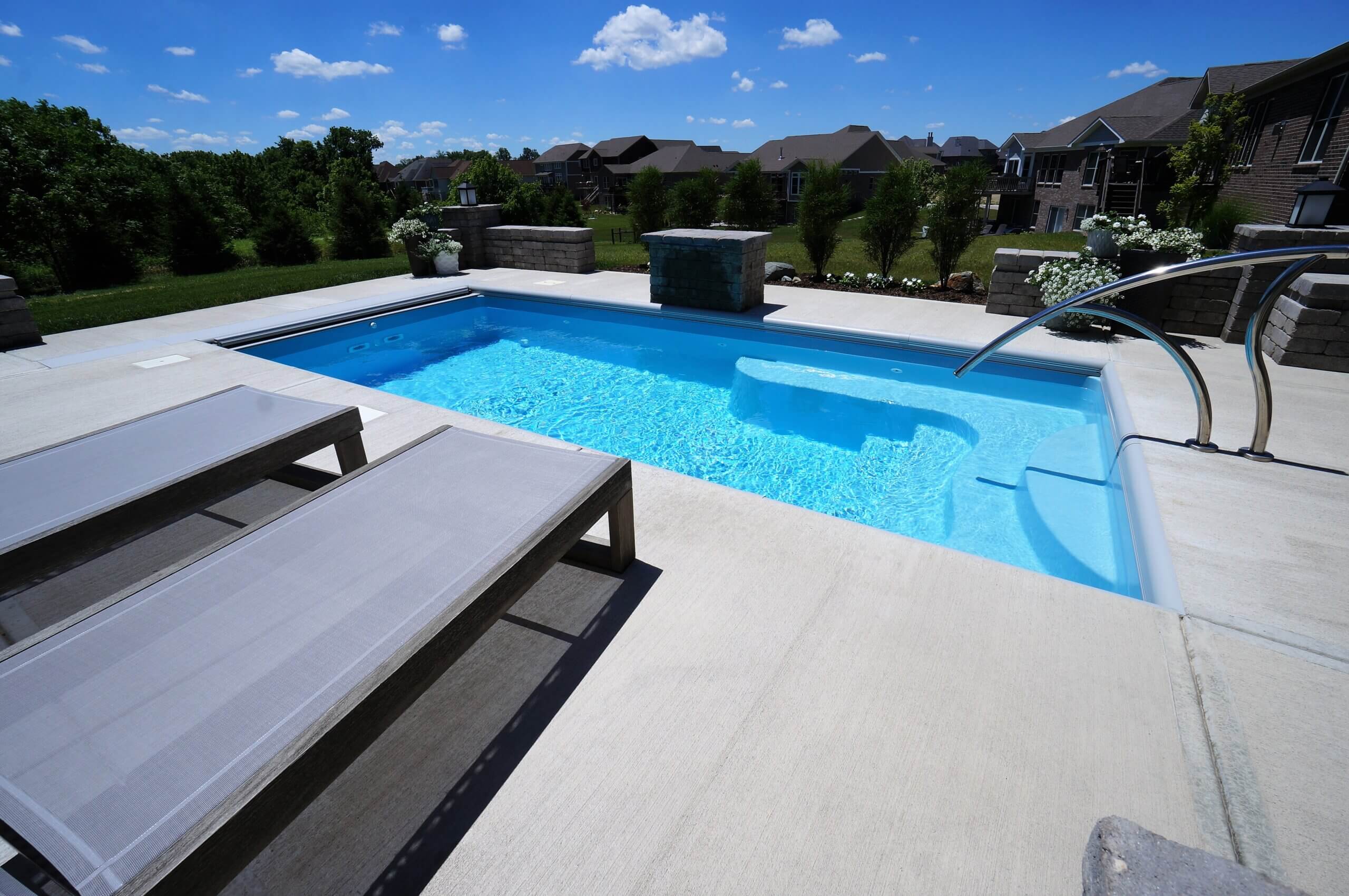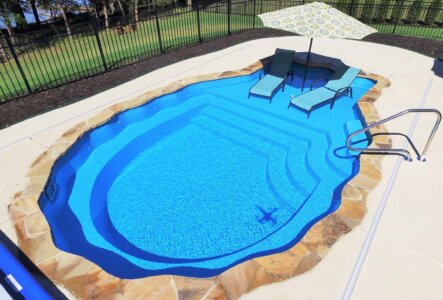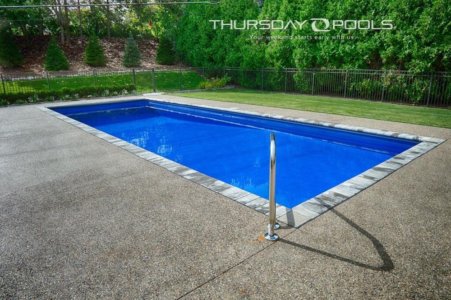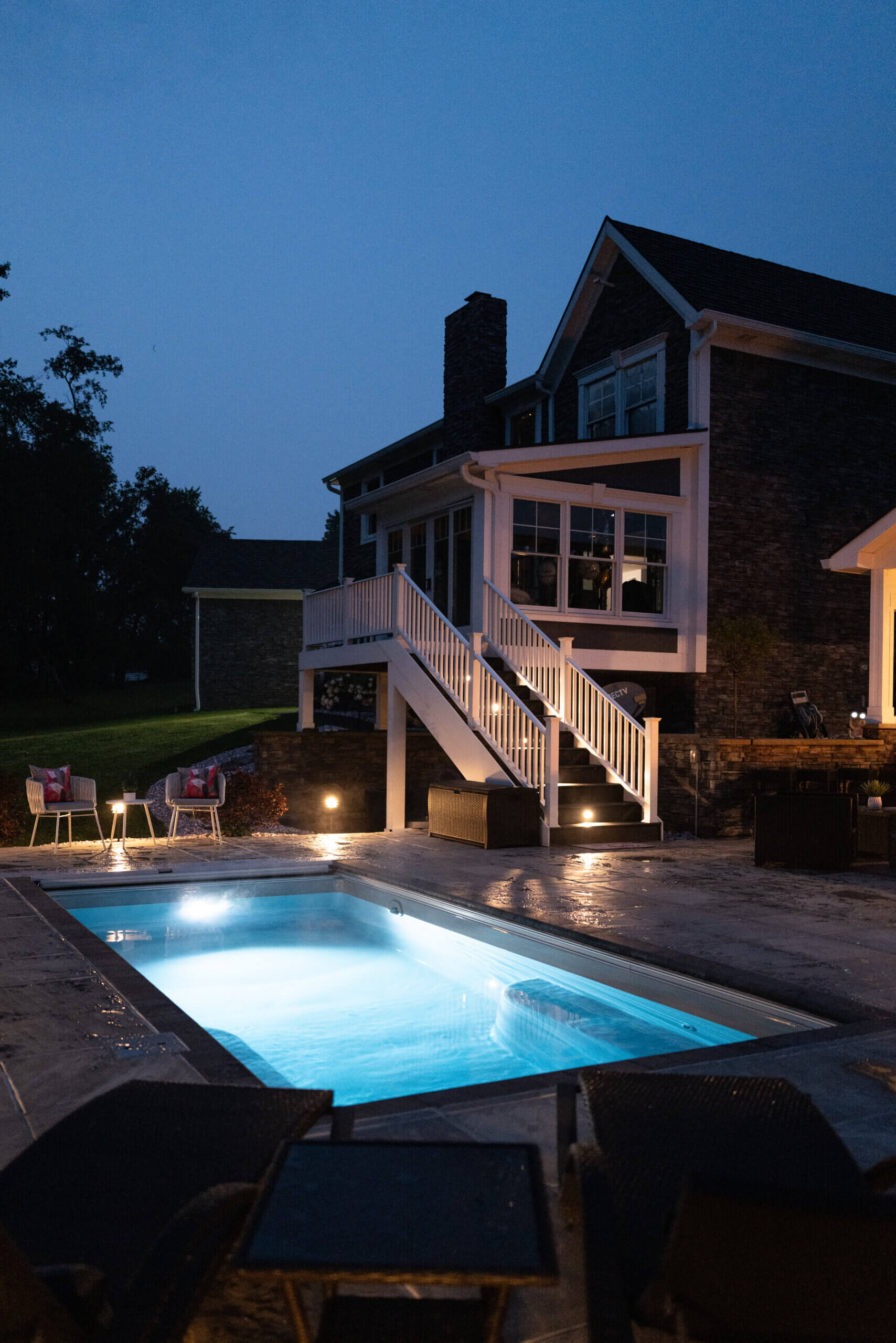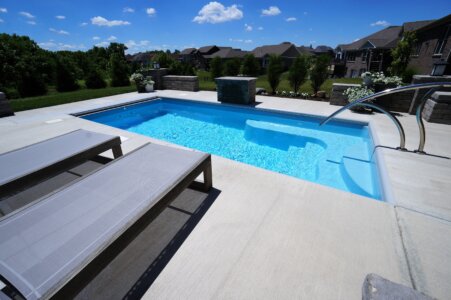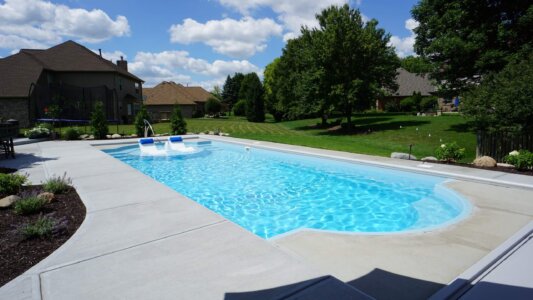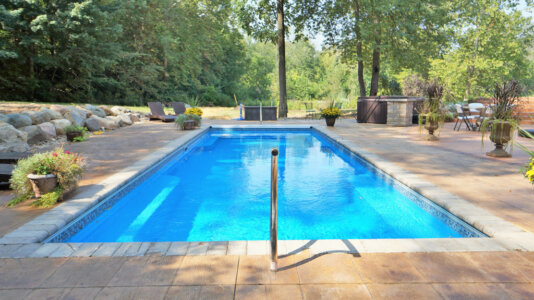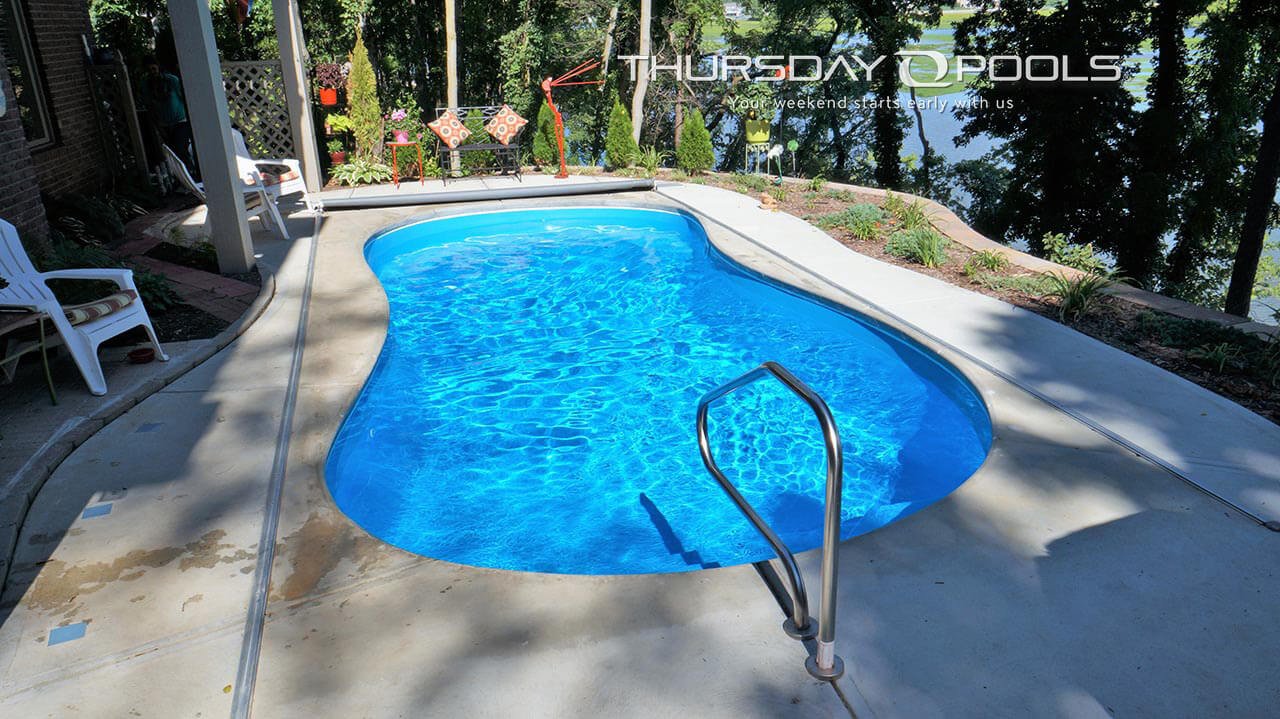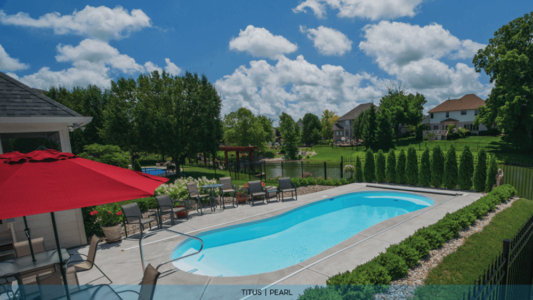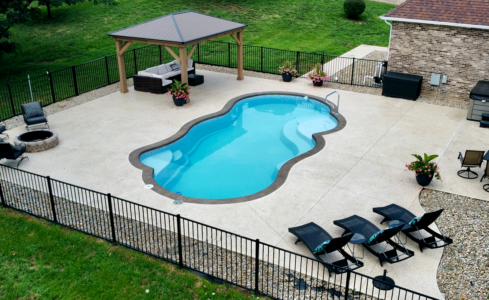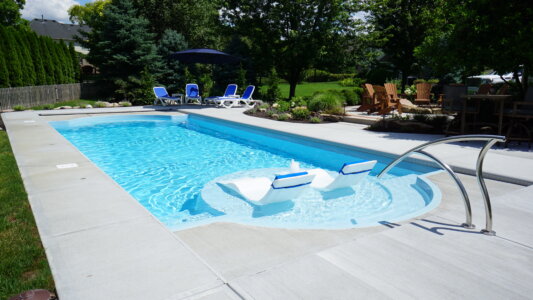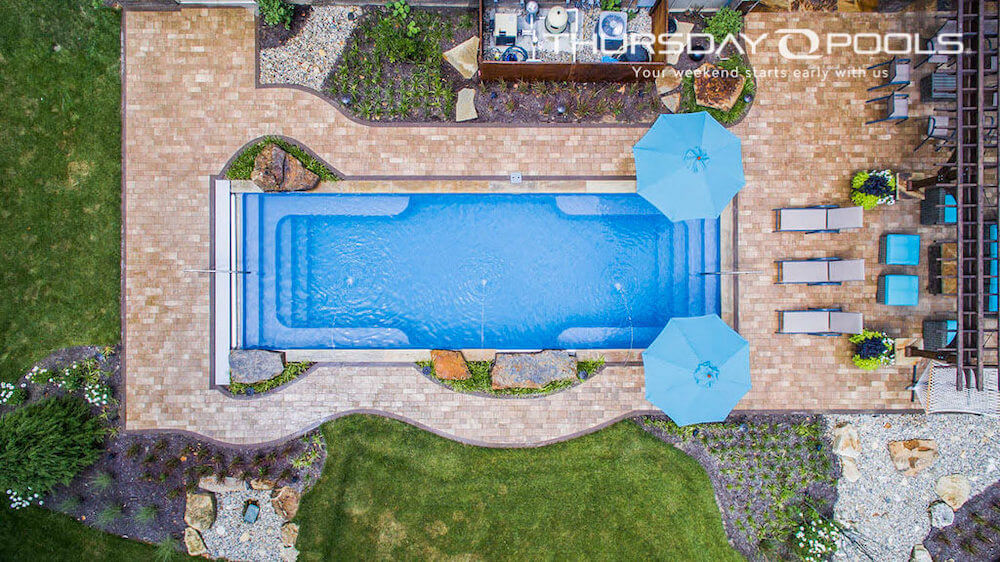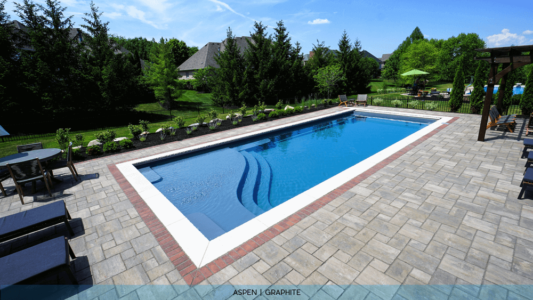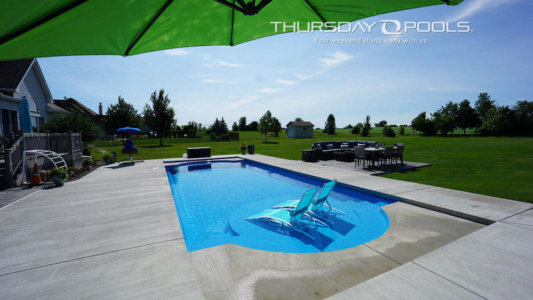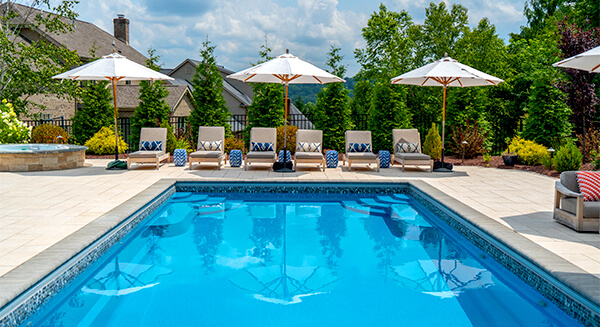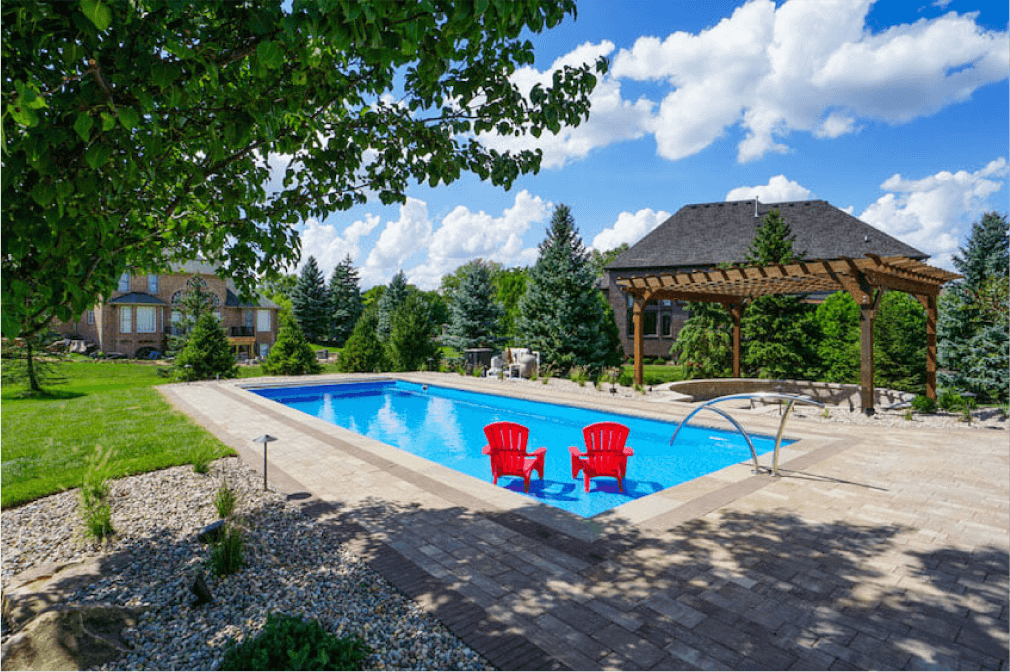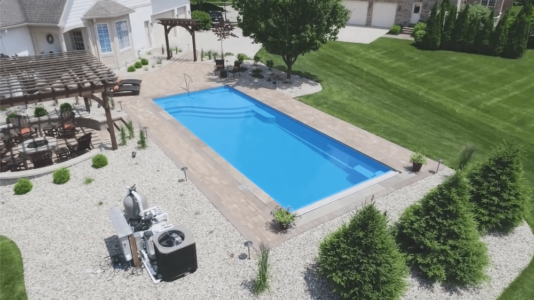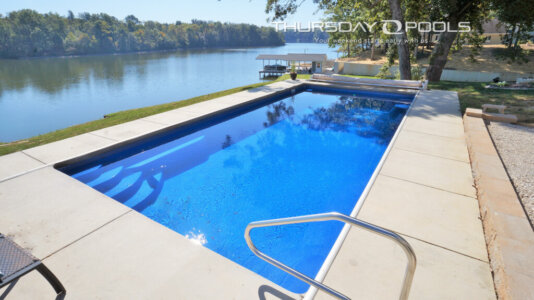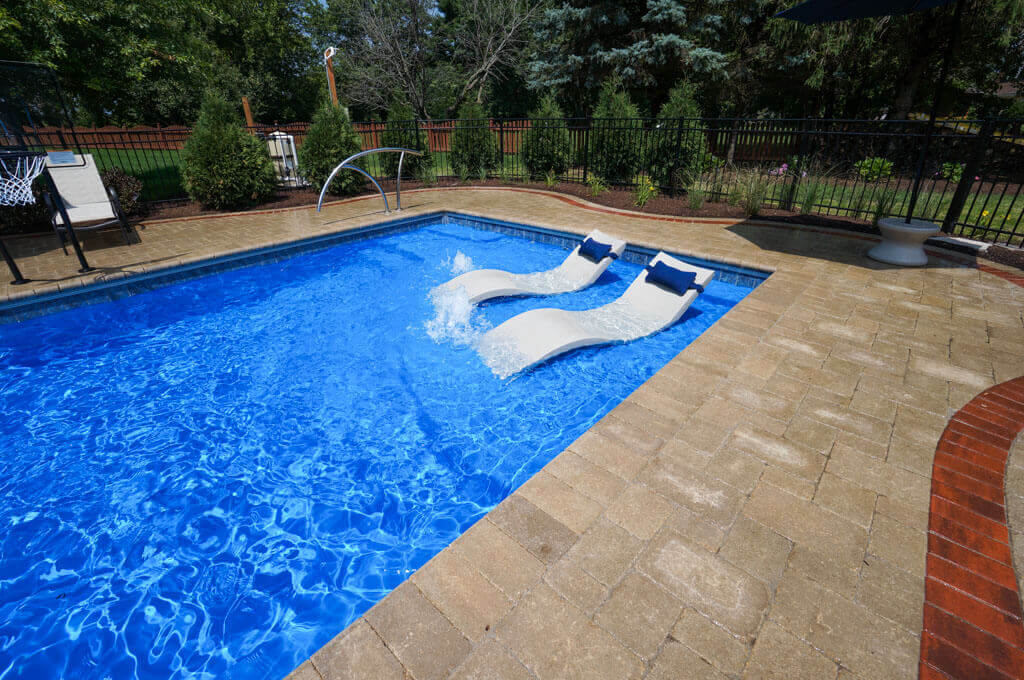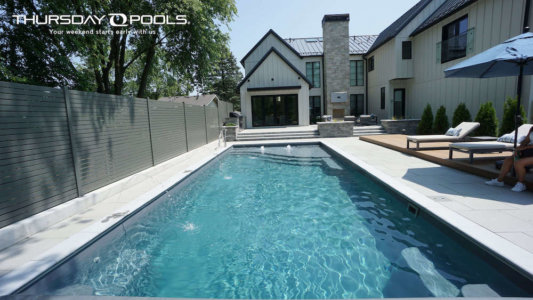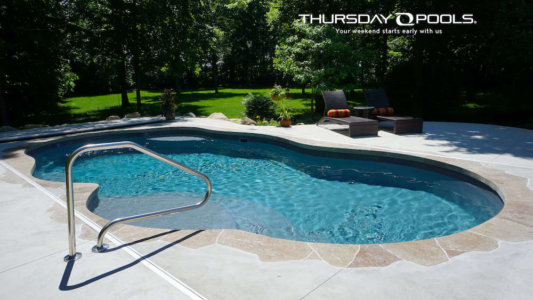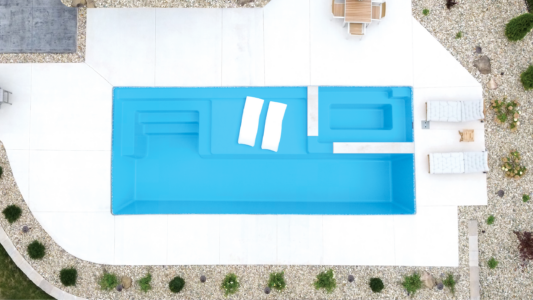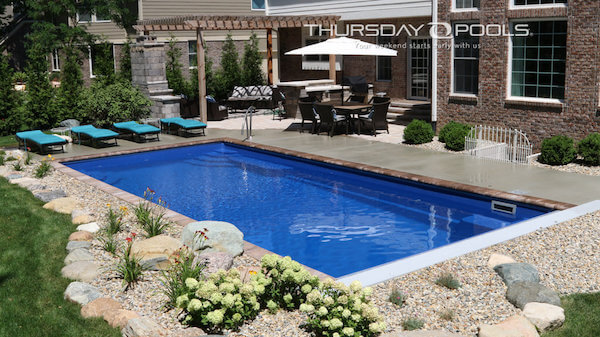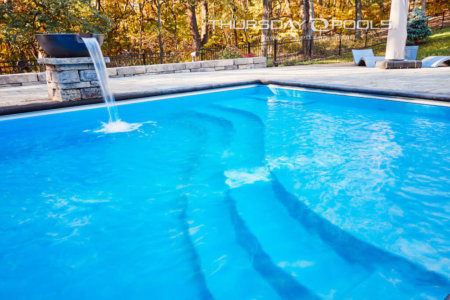Nestled between the rolling hills of New England and the shimmering shores of Long Island Sound, Connecticut offers backyard settings as diverse as its four distinct seasons. When considering fiberglass pool cost in Connecticut, it’s essential to understand how the state’s varied landscape can influence installation costs. Whether your home is tucked into a cozy neighborhood near New Haven or spread out on a wooded lot in the northwest hills, soil conditions, local regulations, and personal preferences will all shape your pool’s design and budget. Working with a local Connecticut fiberglass pool installer will help you create a beautiful, functional pool that’s ready to shine and suit your lifestyle.
How Much Does the Average Fiberglass Pool Cost in Connecticut? Numbers You Should Know
In 2025, Thursday Pools teamed up with trusted independent dealers across Connecticut to collect valuable data on the average cost of installing a fiberglass pool in the state. If you’re beginning to explore fiberglass pool pricing in Connecticut, this overview will help set realistic expectations. Our mission is to guide you through the numbers so you can confidently plan your dream backyard without surprises.
AVERAGE CONNECTICUT FIBERGLASS POOL INSTALLATION BY SIZE |
|||
|---|---|---|---|
| Pool Type | Small Fiberglass Pools | Medium Fiberglass Pools | Large Fiberglass Pools |
| Size Range | Up to 26 ft Long or 400 ft² | 26 to 34 ft Long or 400 to 600 ft² | 35 ft and Longer or 600+ ft² |
| Average Cost | $70,000 | $90,000 | $115,000 |
Keep in mind that these numbers are just a general guideline and starting point. Connecticut’s varied terrain, from rocky soil to wooded lots, and seasonal weather challenges can all influence your total pool cost. Factor in your preferred design features and upgrades, and the price can fluctuate accordingly. The best way to get an accurate estimate for your fiberglass pool is to connect with a trusted, local Thursday Pools dealer who understands the unique demands of building pools in Connecticut’s environment.
Connecticut’s Go-To Fiberglass Pools: Average Installation Costs
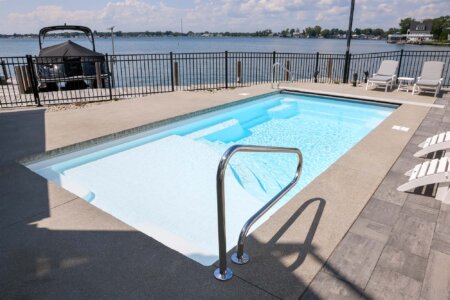
ASPEN (12’ x 25’)
The Aspen offers Connecticut homeowners a perfect blend of simplicity and style, fitting comfortably into everything from compact suburban backyards to more open, wooded spaces. At 12 by 25 feet, this pool’s rectangular shape maximizes swimming space while featuring a spacious tanning ledge that’s ideal for soaking up the summer sun or gathering with friends. Its modern, straightforward design complements Connecticut landscapes from rocky hillsides to coastal retreats.
According to our 2025 survey of Thursday Pools dealers in Connecticut, the average cost of installing an Aspen or comparable fiberglass pool up to 26 feet long or 400 square feet is $70,000.
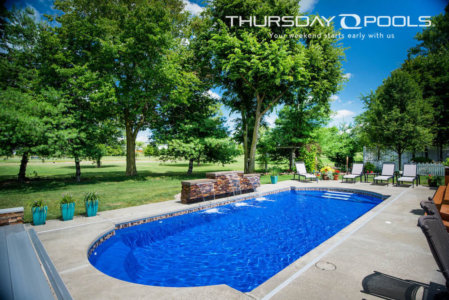
CATHEDRAL (14’ x 33’)
The Cathedral is a standout choice for Connecticut homeowners who want a pool that balances spacious swimming areas with graceful, eye-catching design. Its gently rounded ends add a soft elegance that blends beautifully with both classic New England landscapes and modern outdoor spaces. With wide entry steps and built-in benches, the Cathedral invites effortless relaxation and socializing. It’s perfect for hosting summer gatherings or unwinding after a day exploring the area’s scenic outdoors.
Based on our 2025 survey of Thursday Pools dealers in Connecticut, the average cost to install a Cathedral or similar mid-size fiberglass pool between 26 and 34 feet long or 400 to 600 square feet is $90,000.
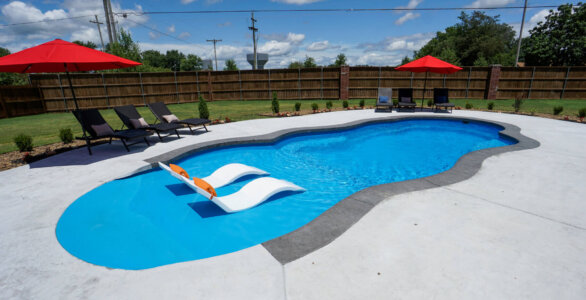
SANDAL BEACH ENTRY (16’ x 39’)
The Sandal Beach Entry pool is a perfect fit for Connecticut homeowners with larger properties who want to combine luxury with laid-back, beach-inspired vibes. Stretching 16 by 39 feet, this spacious fiberglass pool features a gently sloping beach-style entry that creates an inviting, natural feel. It’s ideal for families and guests of all ages. With wide steps, built-in benches, and a generous swim area, the Sandal encourages both active swimming and peaceful relaxation.
According to our 2025 survey of Thursday Pools dealers in Connecticut, the average installation cost for the Sandal or other large fiberglass pools 35 feet or longer or more than 600 square feet is $115,000.
Evaluating Your Connecticut Property for Fiberglass Pool Installation Cost
Connecticut’s beautiful and diverse landscapes make for some truly stunning backyards, but they also bring unique challenges when it comes to installing a fiberglass pool. From the rocky ledges common throughout much of the state to the gentle slopes of the Litchfield Hills, your property’s soil and terrain can impact excavation needs and final costs. If you live near the coast, salty air and drainage considerations come into play, while wooded lots might require some clearing to create the perfect poolside retreat without disturbing the natural beauty.
Your yard’s layout also plays a big role in how smoothly your pool installation goes. Hilly or uneven land, common in many parts of Connecticut, may mean extra work like grading or building retaining walls to ensure your pool sits on a solid, safe foundation. If you’re in a more built-up area like Fairfield County or close to Hartford, getting the pool shell into your backyard might take some creative logistics. Narrow driveways, tight fences, and compact spaces often require a crane or special equipment to get everything in place without a hitch.
The good news? Working with a local fiberglass pool expert means you’ll have someone who knows these challenges inside and out to help turn your backyard dreams into a reality, no matter your Connecticut setting.
| AVERAGE ADDITIONAL YARD-RELATED EXPENSES IN CONNECTICUT | |
| Excavating Rocky Soil | $500 |
| Above-Average Slope Requiring Extra Grading | $1,000 |
| Limited Yard Access | $2,000 |
Connecticut’s Pool Barrier Guidelines: What Every Pool Owner Must Know
In Connecticut, statewide regulations govern residential pool safety to protect families and young children. These rules require enclosing every pool by a barrier at least 4 feet tall. The design of the wall must minimize any gaps or footholds that could allow children to climb over or slip through, creating a secure and reliable perimeter around the pool area.
Beyond these statewide standards, many towns and cities in Connecticut may enforce additional safety requirements. Additional measures may include guidance on specific fence materials, height regulations exceeding the four-foot minimum, or rules about how close fences can be to property lines. Because local ordinances can vary, homeowners should consult the local building department before beginning pool installation or fence construction. This early step helps avoid costly surprises and ensures your pool meets safety requirements from the beginning.
Navigating these safety guidelines is made easier when working with an experienced local pool professional who understands Connecticut’s regulations. They can help you design and install a pool barrier that not only meets legal standards but also complements your backyard’s aesthetics and lifestyle needs.
Based on 2025 estimates from local Connecticut dealers, homeowners can expect to invest $15,800 for a typical 300-linear-foot fence.
Transform Your Connecticut Outdoor Space with Premium Pool Upgrades
When it comes to building the perfect fiberglass pool in Connecticut, the right add-ons can make all the difference. From features that boost relaxation to upgrades that enhance style and convenience, there are plenty of ways to make your pool uniquely yours. These optional enhancements add personality while increasing functionality and enjoyment. To help you explore what’s possible, we’ve gathered some of the top pool upgrade choices among Connecticut homeowners, along with 2025 pricing estimates sourced from Thursday Pools’ trusted dealer network in the state.
Smart Upgrades for a Stress-Free Swim Season
Pool Heater Average Cost in Connecticut: $5,600
Swim longer with water that stays warm in the spring and fall months. A dependable heater can extend your pool season and make Connecticut’s cool mornings or crisp evenings suitable for swimming.
UV Filtration System Average Cost in Connecticut: $3,900
Enjoy crystal-clear water with fewer chemicals. UV systems help neutralize bacteria and algae, offering a cleaner, more comfortable swimming experience.
Pool Automation System Average Cost in Connecticut: $6,300
Manage your pool from anywhere with smart automation. Control temperature, lighting, and filtration right from your phone for ultimate convenience and efficiency.
Pool Safety Covers
Automatic Pool Cover Average Cost in Connecticut: $15,700
Boost safety and reduce upkeep with a cover that opens and closes at the push of a button. It helps conserve water, keeps debris out, and adds a layer of protection for families with young children or pets.
Manual Safety Pool Cover Average Cost in Connecticut: $2,500
A sturdy, budget-friendly option to secure your pool and block leaves, dirt, and Connecticut’s seasonal elements when not in use.
Blend Comfort and Aesthetic Appeal Around Your Fiberglass Pool
Concrete Patio (Approx. 1,200 sq. ft.) Average Cost in Connecticut: $15,800
Durable and low-maintenance, concrete handles Connecticut’s freeze-thaw cycles well and offers a clean, practical poolside surface.
Paver Patio (Approx. 1,200 sq. ft.) Average Cost in Connecticut: $15,900
Pavers provide traction and timeless style with choices like stone, brick, or concrete that are great for a classic New England look.
Landscaping Average Cost in Connecticut: $2,300
Simple additions like native plants, stone borders, and other landscaping elements enhance your pool area and help it blend naturally into your yard.
Upscale Features & Stylish Accents for Your Connecticut Fiberglass Pool
Specialty Waterline Tile Average Cost in Connecticut: $5,000
Give your pool a refined edge with custom waterline tile. Whether you prefer a timeless coastal look or contemporary flair, these tiles can bring color and character to your pool’s border.
LED Pool Lights Average Cost in Connecticut: $1,630 per light
Light up your evenings with energy-efficient LED pool lights. From bright white to vibrant color-changing modes, they set the perfect mood for late-night swims or backyard gatherings.
Deck Jets Average Cost in Connecticut: $800 per jet
Add movement and elegance with deck jets that create graceful water arcs. These features offer both visual beauty and a relaxing soundscape to elevate your poolside experience.
Bubblers Average Cost in Connecticut: $800 per bubbler
Ideal for shallow areas or tanning ledges, bubblers add gentle, bubbling water effects that bring a lively touch to your pool’s design.
Cascading Waterfalls Average Cost in Connecticut: $2,000
Incorporate soothing waterfalls to transform your pool into a peaceful retreat. The gentle cascade creates a spa-like atmosphere perfect for unwinding.
Add-On Spa Average Cost in Connecticut: $15,700
Enhance the luxury of your space with a connected spa designed for relaxation and therapeutic benefits. This seamless addition enhances your pool area with comfort and style.
Make Every Day Feel Like a Vacation with a Custom Fiberglass Pool in Connecticut
Imagine stepping into your backyard sanctuary where the stresses of the day simply melt away. No need to travel far because your custom fiberglass pool is ready to welcome you home. Whether you’re enjoying the quiet charm of Connecticut’s coastal towns like Mystic or Old Saybrook, soaking in the vibrant atmosphere of Hartford or New Haven, or relaxing in the peaceful suburbs of Litchfield or Fairfield County, a fiberglass pool combines luxury, convenience, and durability designed specifically for Connecticut living.
Every Connecticut property has its unique qualities, so working with a local Thursday Pools dealer is invaluable. Their knowledge of Connecticut’s environment means they can help design a pool that fits perfectly into your yard, style, and budget. From detailed site evaluations and expert advice on pool placement to personalized recommendations on features and upgrades, your dealer will become a trusted partner in turning your backyard dreams into a stunning reality.
Thinking about making a splash? Begin your journey by exploring the Thursday Pools Pool Cost Calculator for a transparent view of your investment. Use the Pool Selector Tool to find fiberglass pool models that align with your lifestyle and space. When you’re ready, connect with a local expert who will guide you through every step of the process, ensuring your Connecticut poolside retreat is exactly what you envision.
Get Your Personalized Estimate
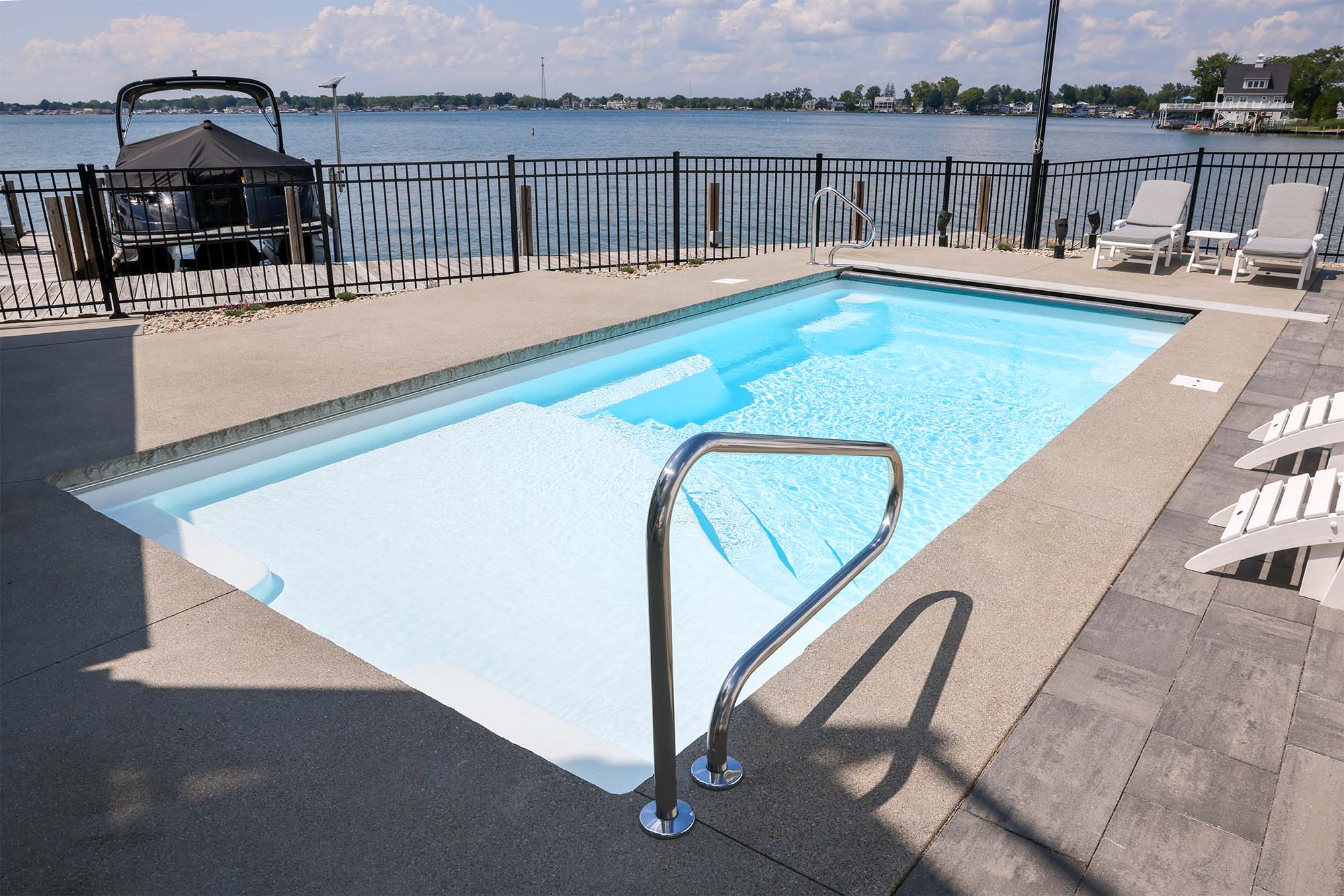
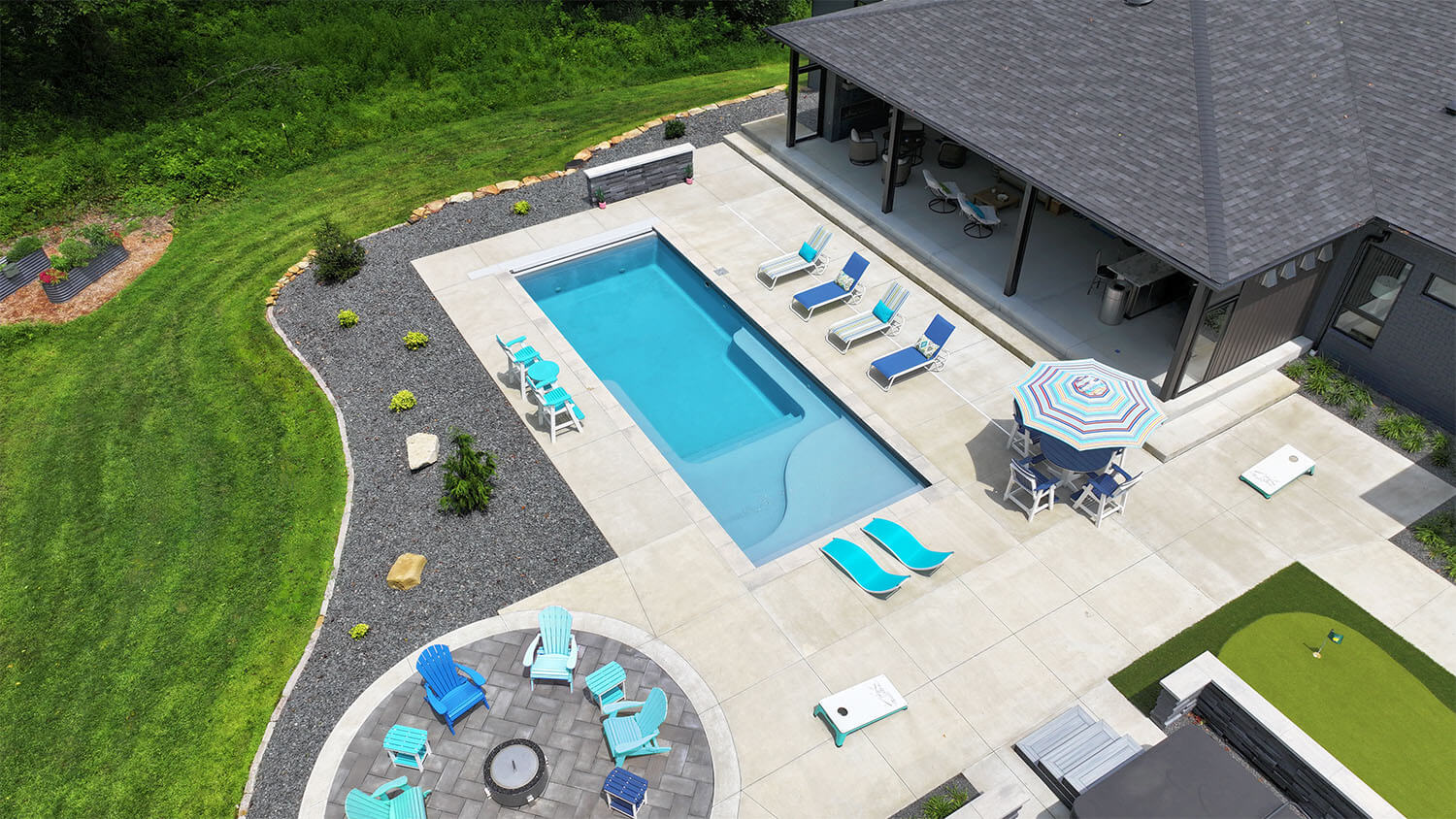
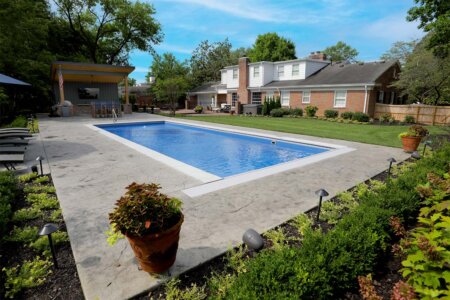 For many homeowners, adding a pool creates a lasting space for connection, recreation, and relaxation. But costs are shifting with the economy, labor market, and materials. Whether you know what type of
For many homeowners, adding a pool creates a lasting space for connection, recreation, and relaxation. But costs are shifting with the economy, labor market, and materials. Whether you know what type of 